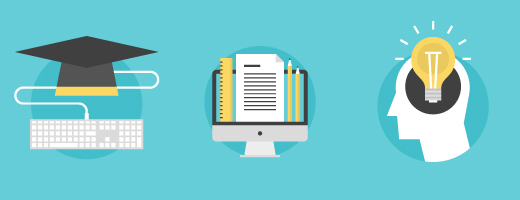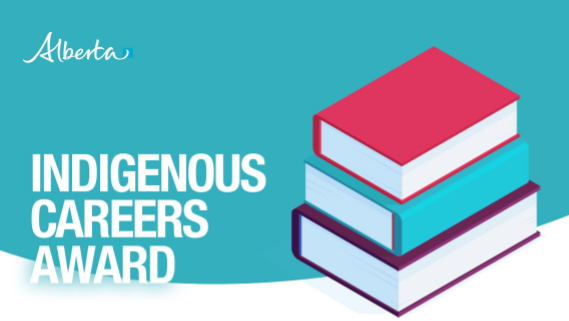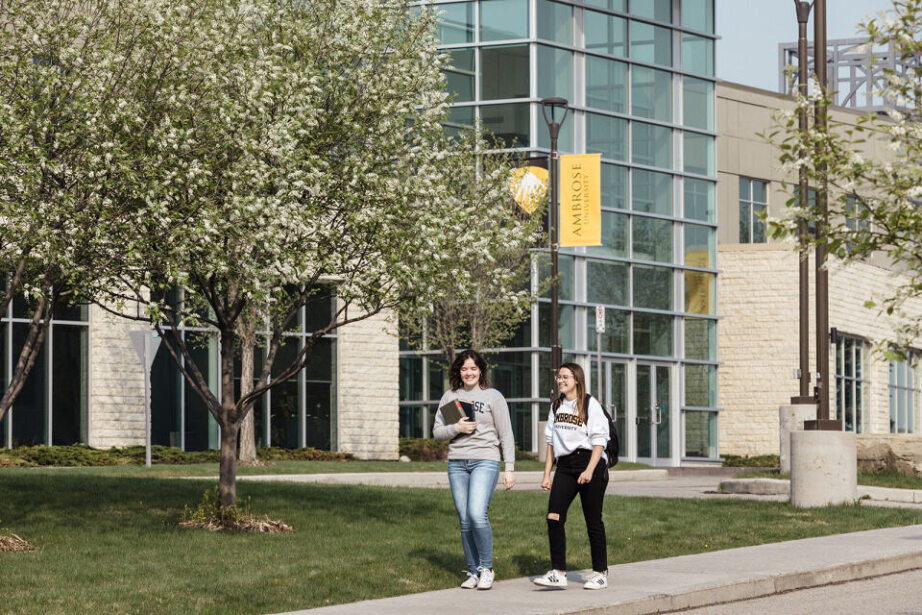Continuing Student Scholarships - Open from January 25 to February 28
Scholarships next Fall for Undergrads and Seminary - apply today!
For full time students - Go to MyAmbrose/Student/Forms
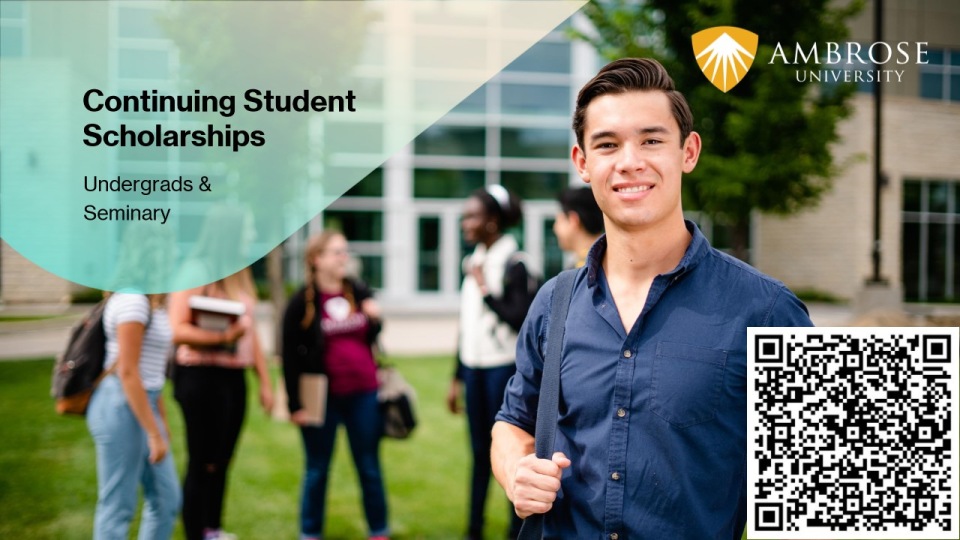
Financial Assistance bursaries - Open from January 25 to June 1
Need $ for school? Awards next Fall for Undergrads and Seminary - apply today!
For full time students - Go to MyAmbrose/Finance/Financial Assistance
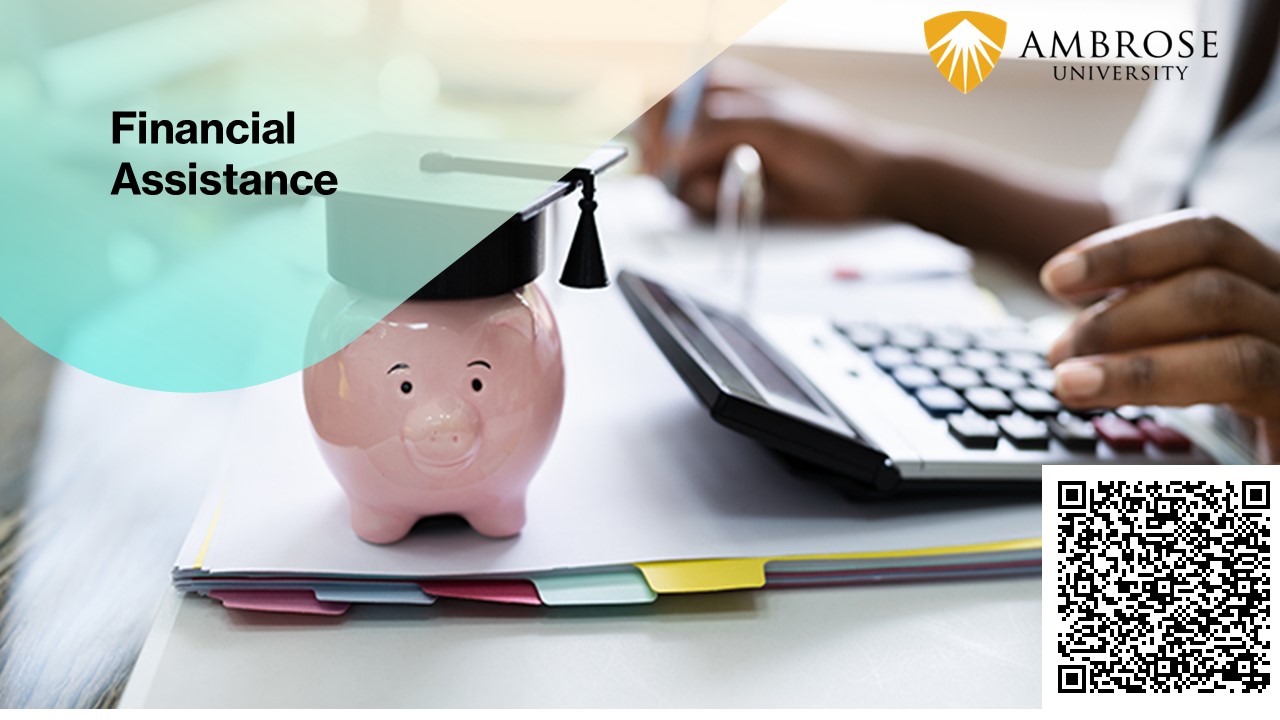
Leadership Scholarships - Open from January 5 to February 5
Leadership scholarships are open from January 5 to February 5 - apply today!
Laurence Decore Award For Student Leadership Scholarship - $1,000
Be involved in either student government or student societies, clubs or organizations, or involved in student organizations at the provincial or national level or in non-profit community organizations
Dr. Gary McPherson Leadership Scholarship - $2,000
Have shown outstanding leadership, especially in the area of disability, and/or initiative to improve the lives of other people while attending Ambrose
Jason Lang Scholarship
Blog Tags
The scholarship recognizes and rewards Alberta post-secondary students for their academic achievements and encourages them to continue in their undergraduate or professional program of study.
Value
$1,000
Deadline
Fall: September 30 or
Winter: January 21
Eligibility Criteria
To be eligible an applicant must:
- Be a Canadian Citizen, Permanent Resident, or Protected Person (visa students are not eligible),
- Be an Alberta resident and to be considered an Alberta resident one of the following conditions must apply:
- one parent, or legal guardian has maintained permanent residence in Canada for at least 12 consecutive months immediately prior to commencing post-secondary studies and be residing in Alberta, or
- Alberta is the last place the student has lived for 12 consecutive months immediately prior to commencing post-secondary studies, or
- the student’s spouse/partner has maintained permanent residence in Alberta for 12 consecutive months prior to the person attending post-secondary.
- Be enrolled full-time in the second or subsequent year of an undergraduate program at a publicly funded post-secondary institution in Alberta,
- Have achieved a minimum Grade Point Average of 3.5 on a 4.0 point scale based on an 80% full course load in the previous fall and winter terms.
Note: A term is defined as a study period of up to 17 weeks in length. Co-op work terms, internships or exchange programs may be eligible as long as these programs are a mandatory component of the undergraduate or professional program.
Students are not eligible for a Jason Lang Scholarship if they:
- Are enrolled in a one year certificate program,
- Do not return to a publicly funded post-secondary institution in the fall or winter terms of the next academic year,
- Already received the Jason Lang Scholarship in the same academic year (fall semester)
- Are recipients of a Louise McKinney Scholarship for the same period of study, or
- Have received the lifetime maximum of three Jason Lang Scholarships.
Nominees must be enrolled at eligible Alberta public post-secondary schools (includes publicly-funded colleges, technical institutes, universities and private colleges accredited to grant degrees).
Canada's Financial Basics
Blog Tags
Did you know that the Government of Canada provides Financial Literacy programs?
They do! Here is some helpful information on Financial Basics. For more information, see Money and Finances.
e-Learning videos — Financial Basics
These eight e-learning videos complement the Financial Basics workshop material. They are an easy and accessible alternative way to boost financial knowledge and plan a more secure financial future. You can use them as part of a Financial Basics workshop, or watch them on your own.
The first seven videos cover topics such as budgeting, credit, debt, saving and investing, financial planning and protecting yourself from fraud. The eighth video gives tips and answers questions about planning and delivering the best Financial Basics workshop.
The Financial Basics e-Learning Project was jointly developed by The Chang School at Ryerson University and the Financial Consumer Agency of Canada with the assistance of the Ontario Securities Commission.
Module 1: How do I prepare a budget?
Module 2: How do I live within my means?
Module 3: Understanding credit
Module 5: Saving and investing
Module 6: Do you have a financial plan?
Module 7: How to protect yourself from financial fraud
Module 8: Workshop delivery tips
Page details
From:
Please contact financialaid@ambrose.edu if you have any questions.
Indigenous Careers Award
The Indigenous Careers Award is designed to encourage Indigenous Albertans (First Nations, Metis and Inuit) to pursue and complete post-secondary studies in certificate, diploma, applied degree and bachelor's degree programs.
Award Value
$2,000 per semester / maximum of $4,000 in an academic year
Credential Types
Students must be enrolled in a certificate, diploma, applied or bachelor’s degree program.
All program bands are eligible for the Indigenous Careers Award.
To Receive This Award
- The Fall 2025 and/or Winter 2026 term (a term is defined as a study period of up to 17 weeks in length),
- At least 60% of a full course load (40% of a full course load if you are a student with a documented permanent disability).
- Have satisfactory academic standing, as determined by the school.
You must also meet all of these eligibility criteria:
- Be a Status Indian/First Nations, Non-Status Indian/First Nations, Métis or Inuit and be able to provide a copy of proof of Indigenous ancestry
- Be a Canadian citizen, permanent resident of Canada or have protected person status under Canada’s Immigration and Refugee Protection Act
- Be a resident of Alberta.
Application Deadline
- Fall - November 5
- Winter - February 5
Indigenous Careers Award Application
Please submit applications and/or inquiries to:
Roxanne Poelstra
Manager, Financial Aid & Awards
financialaid@ambrose.edu
(403) 410-2938
Thank your Donor
Blog Tags
If you received any Ambrose Financial Aid bursaries or Continuing Student scholarships for this year, please Thank your Donor | Ambrose University. This is an opportunity for you to connect with the person or people that were part of helping you prepare for success on your Ambrose journey.
There are some sample letters to serve as a template of how to structure your thank-you letter. You can choose between sending a letter or a video. We have also provided some talking points for you to take advantage of here: Submit Your Letter | Ambrose University.
THANK YOU!!
Jason Lang Scholarship
Blog Tags
The scholarship recognizes and rewards Alberta post-secondary students for their academic achievements and encourages them to continue in their undergraduate or professional program of study.
Value
$1,000
Deadline
September 30, 2025
Eligibility Criteria
To be eligible an applicant must:
- Be a Canadian Citizen, Permanent Resident, or Protected Person (visa students are not eligible),
- Be an Alberta resident and to be considered an Alberta resident one of the following conditions must apply:
- one parent, or legal guardian has maintained permanent residence in Canada for at least 12 consecutive months immediately prior to commencing post-secondary studies and be residing in Alberta, or
- Alberta is the last place the student has lived for 12 consecutive months immediately prior to commencing post-secondary studies, or
- the student’s spouse/partner has maintained permanent residence in Alberta for 12 consecutive months prior to the person attending post-secondary.
- Be enrolled full-time in the second or subsequent year of an undergraduate program at a publicly funded post-secondary institution in Alberta,
- Have achieved a minimum Grade Point Average of 3.5 on a 4.0 point scale based on an 80% full course load in the previous fall and winter terms.
Note: A term is defined as a study period of up to 17 weeks in length. Co-op work terms, internships or exchange programs may be eligible as long as these programs are a mandatory component of the undergraduate or professional program.
Students are not eligible for a Jason Lang Scholarship if they:
- Are enrolled in a one year certificate program,
- Do not return to a publicly funded post-secondary institution in the fall or winter terms of the next academic year,
- Are recipients of a Louise McKinney Scholarship for the same period of study, or
- Have received the lifetime maximum of three Jason Lang Scholarships.
Nominees must be enrolled at eligible Alberta public post-secondary schools (includes publicly-funded colleges, technical institutes, universities and private colleges accredited to grant degrees).
Navigating Canada's Registered Savings Plans: A 2025 Overview
Blog Tags
I found this article that I found interesting. I hope you like it too:
As young Canadians head off to college or university, many benefit from Registered Education Savings Plans (RESPs), which offer a 20% government match on contributions up to a limit. This is part of a broader effort by the government to encourage saving for major life goals—education, retirement, and home ownership.
💸 The Challenge of Saving Across Multiple Accounts
Financial advisers recommend maximizing contributions to all registered plans—RESP, RRSP, TFSA, and FHSA—but rising unemployment, cost of living, and economic uncertainty make that difficult. In 2023:
- 11.3 million Canadians contributed to either an RRSP or TFSA.
- Only 2.5 million contributed to both.
- 484,000 contributed to the newly launched First Home Savings Account (FHSA).
🧭 How to Prioritize Your Savings
Experts suggest starting with a TFSA:
- It’s the most liquid and flexible, ideal for emergency funds.
- Contributions can be invested in stocks, ETFs, and bonds.
- Contribution room starts at age 18; the 2023 limit was $7,000.
If you're planning to buy a home:
- Consider the FHSA, which offers tax-deductible contributions up to $8,000/year and $40,000 lifetime.
- Funds must be used for a home purchase—withdrawals for other needs incur penalties.
- Alternatively, up to $60,000 can be withdrawn from an RRSP for a first home, but must be repaid.
For education:
- RESP contributions are matched by the government until the end of the year the beneficiary turns 17.
- Timing contributions before that cutoff is crucial to maximize benefits.
🧠 Smart Strategies & Timing
- You can open accounts to start accumulating contribution room—even without immediate deposits.
- Consider contributing to RRSP or FHSA to trigger a tax refund, which can then be used to fund other goals.
- The earlier you start saving, the more you benefit from tax-deferred growth.
💬 As Sara Kinnear of IG Wealth Management puts it:
“When do you want to have this money available to you? Because that’s going to dictate realistically which type of registered account you want to use.”
For the original article, please see: RRSP, TFSA, FHSA, RESP: The ABCs of how to divvy up savings across accounts
Please contact financialaid@ambrose.edu if you have any questions.
Alexander Rutherford Scholarship now available!
Blog Tags
Alexander Rutherford Scholarship
Students can now log in to their Alberta Student Aid accounts to apply online for
the 2025-26 Alexander Rutherford High School Achievement Scholarship.
For more information on the Alexander Rutherford Scholarship, including eligibility and how to apply, visit:
Alberta Scholarships and Awards
The 2025-26 scholarship and award applications are now available!
Learn more about scholarships and awards offered by the Alberta Government and apply at Alberta Scholarships.



